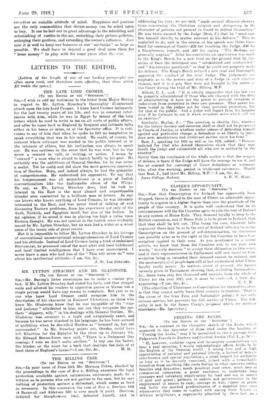THE BILLING CASE.
[To THE EDITOR OP THE " SPECTATOR.")
SIR,—In your issue of June 15th Mr. Herman Cohen, shocked by the proceedings in the case of Rex v. Billing, examines the legal protection available against calumnious statements made by a witness as to persons who are not parties to the case, but he says nothing of protection against a defendant, which seems at least as necessary. In this connexion the case of Rex v. Davison 1821 (4 Barnwell and Alderson 329) is very much in point. Davison, indicted for blasphemous libel, defended himelf, and in addressing the jury, we are told, "made several offeusive observe tions concerning the Christian religion and derogatory to tit: character of persons not present in Court to defend themselves?' He was twice warned by the Judge (Best, J.) that he " must con- fine himself strictly to matter relevant to his defence." This he neglected to do, and in the course of his speech was three time: fined for contempt of Court—,220 for insulting the Judge, Zia for a blasphemous remark, and .P.410 for saying - The Bishops are generally sceptics." After his conviction an application was mad,' to the King's Bench for a new trial ou the ground that by this series of fines the defendant was " intimidated and confounded " and " his energies paralysed," so that he could not properly make his defence. The King's Bench refused a new trial and thoroughly approved the conduct of the trial Judge. The judgments are emphatic as to the powers and duty of a Judge in such circum- stances, and it is a pity they were not brought to the notice of the Court during the trial of lkfr. Billing, M.P.
Abbott, C. J., said : " It is utterly impossible that the law can be properly administered if those who are charged with the duty
of administering it have not the power to prevent instances ol indecorum from occurring in their own presence. That power hes been vested in the judges not for their personal protection, but
fer that of the publio. And a judge will depart from his boiuiden duty if he forbears to use it when occasions arise which call for its exercise."
Similarly, Bayley, J.: "The question is shortly this, whether for the future decency and decorum shall or shall not be preserved
in Courts of Justice, or whether under odour of defending himself against any particular charge, a defendant is at liberty to intro- duce new, mischievous and irrelevant matter upon his trial." Best, J., speaking for 1918 as well as for 1821, added : " Persons indicted for libel who defend themselves think that they may insult the judge and calumniate all who are in authority in the country."
Surely then the conclusion of the whole matter is that the weapon of defence is there if the Judge will have the courage to use it, and fine or commit for contempt of Court defendants or witnesses Who, after due warning, persist in irrelevant calumnies. Would that Best, J., had tried Mr. Billing, M.P. !—I am, Sir, &c.,


























 Previous page
Previous page